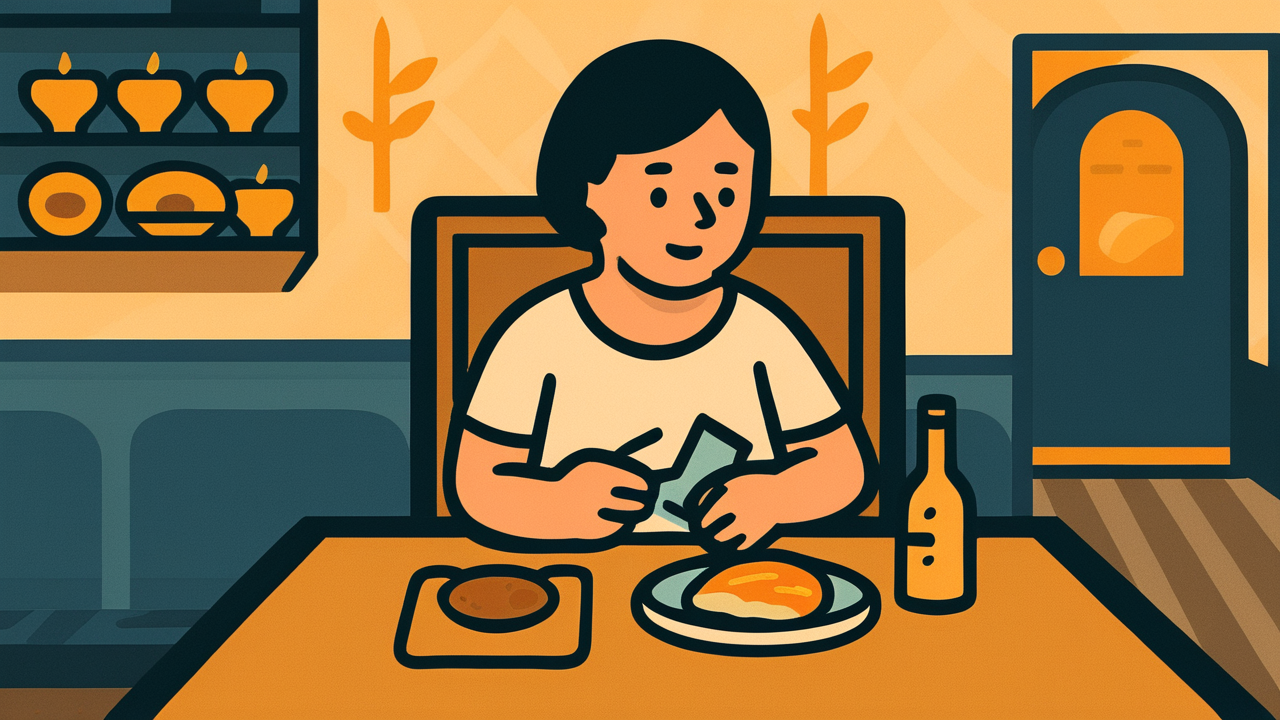How to Read “親が死んでも食休み”
Oya ga shinde mo shokuyasumi
Meaning of “親が死んでも食休み”
This proverb means that the rest period after meals (food rest) should always be taken, no matter what kind of emergency occurs.
It teaches through extreme expression that even during life’s greatest emergency – the death of a parent – one must still ensure time for post-meal digestion. This is not at all about disregarding parents, but rather an expression that emphasizes the importance of health management. If you move vigorously immediately after eating or act hastily, you may suffer from indigestion and harm your health. If that happens, you won’t be able to perform when it truly matters. In other words, the teaching embedded here is that precisely because it’s an emergency, you should properly manage your physical condition and face the situation in perfect health. Even today, this proverb is understood as showing the importance of maintaining basic life rhythms, especially when busy.
Origin and Etymology
Regarding the origin of this proverb, clear documentary evidence has not actually been found. However, judging from the structure of the phrase, it’s thought to have emerged from the common people’s sense of life during the Edo period.
In Japan of that time, meals were important divisions of the day, and the rest period after lunch especially was indispensable time for workers. In an era centered on physically demanding work like farming and craftwork, post-meal digestion time wasn’t merely a break but essential time for maintaining health.
The extreme expression “even if a parent dies” represents the characteristic exaggeration that Edo period commoners favored. People of that time often used the form “even if…” to bring up impossibly serious situations when emphasizing things. By invoking a parent’s death – life’s greatest event – they likely made the importance of food rest stand out.
Behind this proverb’s establishment lies the practical wisdom of Edo period people. In an era when medicine wasn’t advanced, indigestion could lead to serious health problems. Therefore, it’s thought that the life wisdom of taking post-meal rest no matter how rushed one was became embedded in this saying.
Usage Examples
- Just because there’s an important meeting doesn’t mean you should leave immediately after lunch – they say “Parent dies even food rest,” right?
- Today the deadline is approaching, but “Parent dies even food rest,” so let me take a short break before getting started
Modern Interpretation
In modern society, the meaning of this proverb has changed significantly and is often used with misunderstanding. Originally it was practical teaching about the importance of health management, but now it’s often used to mean “not disrupting one’s own pace no matter what” or “maintaining one’s own pace.”
Particularly on social media and the internet, some people use “Parent dies even food rest” with somewhat negative nuances like “thick-skinned enough not to be moved by any emergency” or “prioritizing oneself over others.” This is an interpretation that greatly deviates from the original meaning.
However, considering modern work styles, the essential value of this proverb has become more important than ever. In a digital society where contact is possible 24 hours a day, many people respond to emails and messages even during meals. Now that remote work has spread and the boundary between meals and work has become ambiguous, it’s necessary to consciously secure time for “food rest.”
Medically too, it’s proven that appropriate rest after meals aids digestive function and leads to improved afternoon concentration. For modern people, this proverb may function as a warning that “in pursuing efficiency, we must not neglect basic physiological needs.”
When AI Hears This
When modern people hear “food rest,” they tend to imagine the luxurious time of lounging on a sofa after getting full, but “food rest” in the Edo period was a completely different concept. For commoners of that era, meals were basically twice a day, and post-meal rest was a life-or-death necessity to prevent illness from indigestion. From a medical perspective, the parasympathetic nervous system becomes dominant after eating and blood flow concentrates in the digestive organs, so vigorous activity significantly impairs digestive function.
Given this physiological fact, “even if your parents die, take your food rest” is by no means a cold-hearted teaching. Rather, it represents extremely rational survival wisdom that says “no matter what emergency arises, you must not ignore basic human physiological phenomena.”
However, in modern times, as food became abundant and food rest transformed into an “optional luxury,” this proverb came to be misunderstood as a symbol of “heartlessness” and “laziness.” Precisely because we live in an era where food is available 24 hours a day at convenience stores, we have lost sight of the essential importance of eating and rest.
In fact, many of today’s problems with death from overwork begin with disregarding basic physiological needs. The concept of “food rest” that people in the Edo period took for granted may be the life wisdom that modern people most need to relearn.
Lessons for Today
What this proverb teaches us today is the importance of maintaining basic lifestyle habits precisely when it truly matters. During emergencies or busy periods, we tend to rush through meals or cut back on breaks, but that becomes counterproductive.
In modern society, “time efficiency” tends to be emphasized, but the human body has natural rhythms. If you ignore those rhythms and continue pushing yourself unreasonably, your long-term performance will actually decline. By taking food rest, afternoon concentration improves, and you can ultimately produce better results.
Also, this proverb teaches us the meaning of “taking care of yourself.” While sacrificing yourself for others is sometimes considered a virtue, you can truly help people only by first organizing your own health and physical condition.
In busy daily life, securing even a little time for yourself. That’s not selfishness at all, but a wise judgment as a responsible adult. Why don’t you too try spending post-meal moments leisurely starting today?



Comments